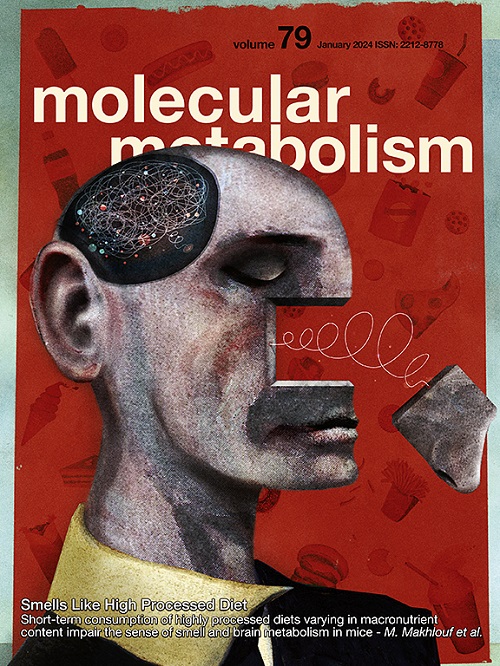Prlhr/GPR10和Npffr2/GPR74在PrRP喂养反应中的作用
IF 7
2区 医学
Q1 ENDOCRINOLOGY & METABOLISM
引用次数: 0
摘要
NTS中的几组神经元抑制食物摄入,包括表达prhl的神经元(NTSPrlh细胞)。人工激活NTSPrlh细胞不仅减少摄食,而且NTSPrlh神经元的Prlh(编码神经肽PrRP)的表达和神经传递有助于抑制食物摄入和体重,特别是在高脂肪饮食(HFD)的动物中。我们使用缺乏PrRP受体GPR10和/或GRP74(分别由Prlhr和Npffr2编码)的动物,通过NTSPrlh神经元(NTSPrlhOX小鼠)中Prlh的表达增加以及对厌食PrRP类似物p52的反应,来确定它们在抑制食物摄入和体重中的作用。虽然Prlhr在hfd喂养的对照动物的食物摄入和体重限制中发挥了至关重要的作用,但需要Prlhr和Npffr2的联合缺失才能消除NTSPrlhOX小鼠的食物摄入限制。然而,P52独立于这两种受体抑制摄食。因此,每种受体都可以参与ntsprhl介导的食物摄入和体重增加的抑制,而PrRP类似物治疗可以通过不同的系统介导其作用。虽然Prlhr在体重增加的生理抑制中起着至关重要的作用,但任何一种受体的作用都能够通过响应增强的NTSPrlh信号来改善肥胖。本文章由计算机程序翻译,如有差异,请以英文原文为准。
Roles for Prlhr/GPR10 and Npffr2/GPR74 in feeding responses to PrRP
Objective
Several groups of neurons in the NTS suppress food intake, including Prlh-expressing neurons (NTSPrlh cells). Not only does the artificial activation of NTSPrlh cells decrease feeding, but also the expression of Prlh (which encodes the neuropeptide PrRP) and neurotransmission by NTSPrlh neurons contributes to the restraint of food intake and body weight, especially in animals fed a high fat diet (HFD). We set out to determine roles for putative PrRP receptors in the response to NTS PrRP and exogenous PrRP-related peptides.
Methods
We used animals lacking PrRP receptors GPR10 and/or GPR74 (encoded by Prlhr and Npffr2, respectively) to determine roles for each in the restraint of food intake and body weight by the increased expression of Prlh in NTSPrlh neurons (NTSPrlhOX mice) and in response to the anorectic PrRP analog, p52.
Results
Although Prlhr played a crucial role in the restraint of food intake and body weight in HFD-fed control animals, the combined absence of Prlhr and Npffr2 was required to abrogate the restraint of food intake in NTSPrlhOX mice. p52 suppressed feeding independently of both receptors, however.
Conclusions
Hence, each receptor can participate in the NTSPrlh-mediated suppression of food intake and body weight gain, while PrRP analog treatment can mediate its effects via distinct systems. While Prlhr plays a crucial role in the physiologic restraint of weight gain, the action of either receptor is capable of ameliorating obesity in response to enhanced NTSPrlh signaling.
求助全文
通过发布文献求助,成功后即可免费获取论文全文。
去求助
来源期刊

Molecular Metabolism
ENDOCRINOLOGY & METABOLISM-
CiteScore
14.50
自引率
2.50%
发文量
219
审稿时长
43 days
期刊介绍:
Molecular Metabolism is a leading journal dedicated to sharing groundbreaking discoveries in the field of energy homeostasis and the underlying factors of metabolic disorders. These disorders include obesity, diabetes, cardiovascular disease, and cancer. Our journal focuses on publishing research driven by hypotheses and conducted to the highest standards, aiming to provide a mechanistic understanding of energy homeostasis-related behavior, physiology, and dysfunction.
We promote interdisciplinary science, covering a broad range of approaches from molecules to humans throughout the lifespan. Our goal is to contribute to transformative research in metabolism, which has the potential to revolutionize the field. By enabling progress in the prognosis, prevention, and ultimately the cure of metabolic disorders and their long-term complications, our journal seeks to better the future of health and well-being.
 求助内容:
求助内容: 应助结果提醒方式:
应助结果提醒方式:


